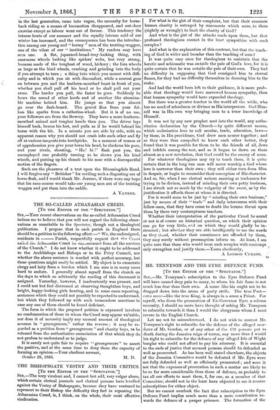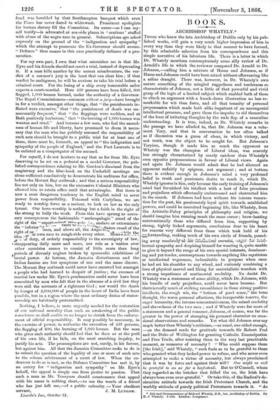MR. TENNYSON AND THE EYRE DEFENCE FUND.
[To THE EDITOR OF THE "SPECTATOR."] Sin,—Mr. Tennyson's subscription to the Eyre Defence Fund will have caused deep pain to many, to whom his fair fame is not much less dear than their own. A name like his ought not to be dragged down into the arena of party strife. The true Poet— votes sacer—like the true King, is always in a sense a Priest. For myself, who deem the prosecution of Ex-Governor Eyre a solemn necessity, I should no more have thought of asking Mr. Tennyson to subscribe towards it than I would the clergyman whom I most revere in the English Church.
Let me not be misunderstood. I do not wish to contest Mr. Tennyson's right to subscribe for the defence of the alleged mur- derer of Mr. Gordon, or of any other of the 439 persons put to death during the Jamaica reign of terror, any more than I would his right to subscribe for the defence of any alleged Isle of Wight burglar who could not afford to pay his attorney. It is essential to the ends of justice that accused persons should be defended as well as prosecuted. As has been well stated elsewhere, the objects of the Jamaica Committee would be defeated if Mr. Eyre were not fully defended as well as efficiently prosecuted ; and were it not that the expenses of prosecution in such a matter are likely to be so far more considerable than those of defence, as probably to tax all our efforts to meet them, I, for one, as a member of that Committee, should not in the least have objected to see it receive subscriptions for either object.
But we cannot overlook the fact that subscription to the Eyre Defence Fund implies much more than a mere contribution to- wards the defence Of a pauper prisoner. The formation of the
fuad was heralded by that Southampton banquet which even the Times has never dared to whitewash. Prominent apologists for hurhan slavery fill the Committee. Its cause—as I can my- self testify—is advocated at sea-side places, in ' orations ' stuffed with abuse of the negro race in general. Subscriptions ..1.‘re asked expressly on the ground of the "indignation and sympathy" which the attempt to prosecute the Ex-Governor should arouse. " Defence " thus means in this case practically defiance of a pro-
secution.
For my own part, I own that what astonishes me is that Mr. Eyre and his friends should not court a trial, instead of deprecating it. If a man kills another by the merest misadventure, the ver- dict of a coroner's jury is the least that can clear him ; if that verdict be ambiguous, he will be anxious to take his trial before a criminal court. For the losing of a ship every honourable sailor
expects a court-martial. Here 439 persons have been killed, 600 flogged, 1,000 houses burned, under the authority of a Governor. The Royal Commissioners—coroners without a jury—have brought in for a verdict, amongst other things, that "the punishments in- flicted were excessive," that "the punishment of death was un- necessarily frequent," that "the floggings were reckless, and at Bath positively barbarous," that "the burning of 1,000 houses was wanton and cruel." And because a few men, who feel the sacred- ness of human life and liberty, have presumed to deem it neces; sary that the man who has publicly assumed the responsibility of such acts should be brought to a public trial for at least one of them, there must be, forsooth, an appeal to "the indignation and sympathy of the people of England," and the Poet Laureate is to be enlisted as a compurgator of the accused.
For myself, I do not hesitate to say that so far from Mr. Eyre
deserving to be set on a pedestal as a model Governor, the pub- lished correspondence relating to Mr. Gordon's dismissal from the magistracy and the blue-book on the Underhill meetings are alone sufficient conclusively to demonstrate his unfitness for office, before the Morant Bay outbreak; and that a serious responsibility lies not only on him, but on the successive Colonial Ministers who allowed him to retain office until that catastrophe. But there is now a most dangerous tendency in the English mind to sever power from responsibility. Poisoned with Carlylism, we are ready to worship force as a saviour, to look on law as the only tyrant. Our hero-worship is nothing but a faith in the right of the strong to bully the weak. From this have sprang as neces- sary consequences the fashionable " anthropologic " creed of the right of the " supprioaasracleno--relf.-;. e., enslave or exterminate the " inferior "-f d above all, the An1--" ioon creed of the
ones, angss,, right of as" ' n" „dr own race to rough-ride every other. ai"Pea idea co'
of duty, of orderly responsibility to the sovereignty of law, disappearing daily more and more, our rule as a 'nation over other countries comes to consist of little more than long t periods of slovenly neglect broken by spasmodic exhibitions of
brutal power. At bottom, the Jamaica disturbances and the Indian famine are but symptoms of one and the same disease. The Morant Bay outbreak could never have occurred but amongst a people who had learned to despair of justice ; the excesses of martial law under Mr. Eyre's proclamation could never have been committed by men who felt that in the absence of a civil law they were still the servants of a righteous God ; nor would the death by hunger of 2,000,000 of people in the heart of India have been possible, but in a region where the most ordinary duties of states- manship are habitually pretermitted.
Nothing, I believe, is more urgently needed for the restoration of our national morality than such an awakening of the public conscience as shall enable us no longer to shrink from the enforce- ment of official responsibility. It may possibly be necessary, in the exercise of power, to authorize the execution of 439 persons, the flogging of 600, the burning of 1,000 houses. But the man who gives such authority should feel that he does so at the peril of his own life, if he fails, on the most searching inquiry, to justify his acts. The presumptions are not, surely, in his favour, but against him. All that the Jamaica Committee seeks to do is to submit the question of the legality of one or more of such acts to the solemn arbitrament of a court of law. When the en- deavour to do so is met, as the Defence Committee has met it, by an outcry for "indignation and sympathy" on Mr. Eyre's behalf, the appeal is simply one from justice to passion. That suCh a man as Mr. Tennyson should countenance that appeal with his name is nothing short,—to use the words of a friend who has just left me,—of a public calamity. —Your obedient































 Previous page
Previous page